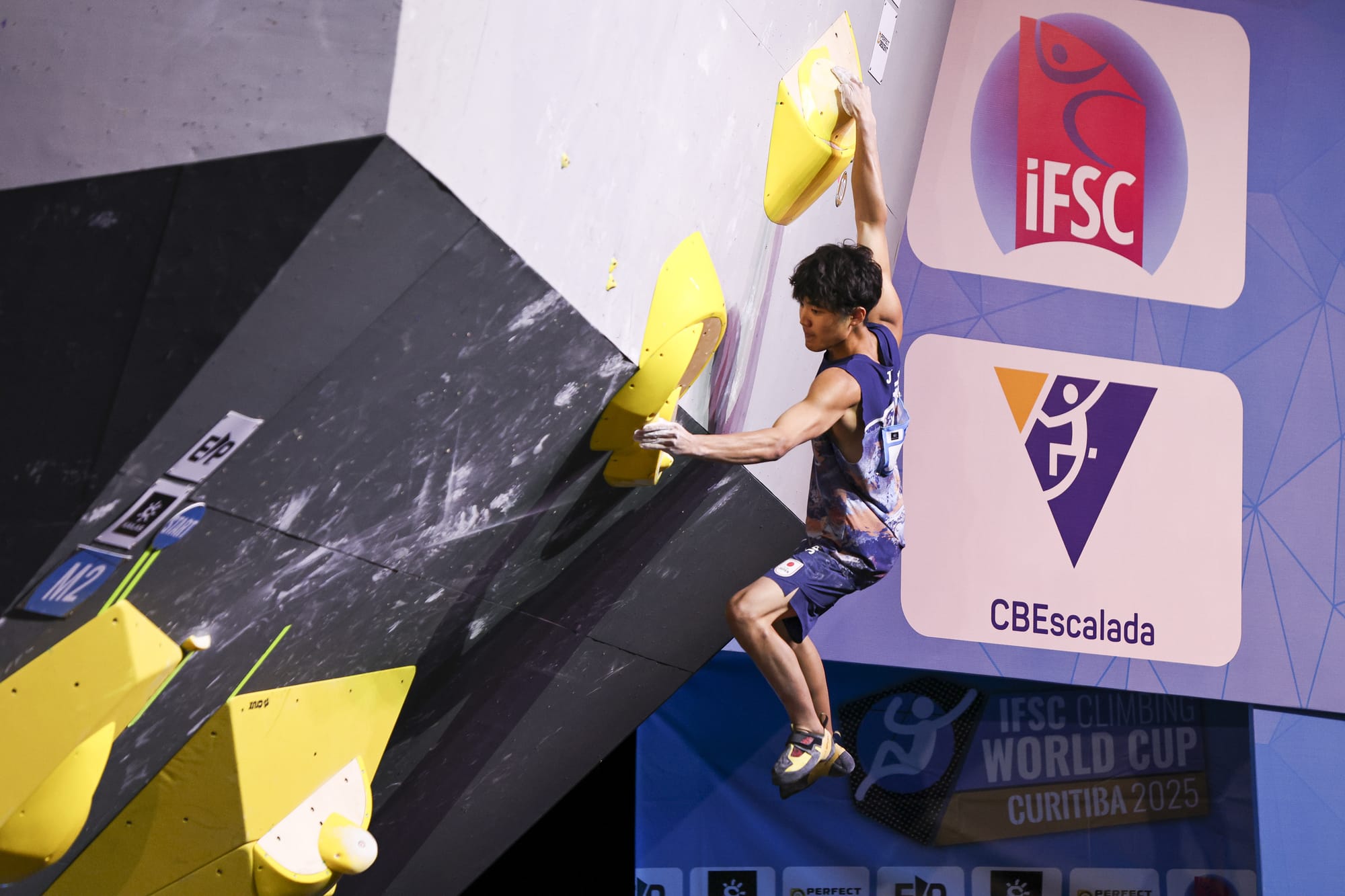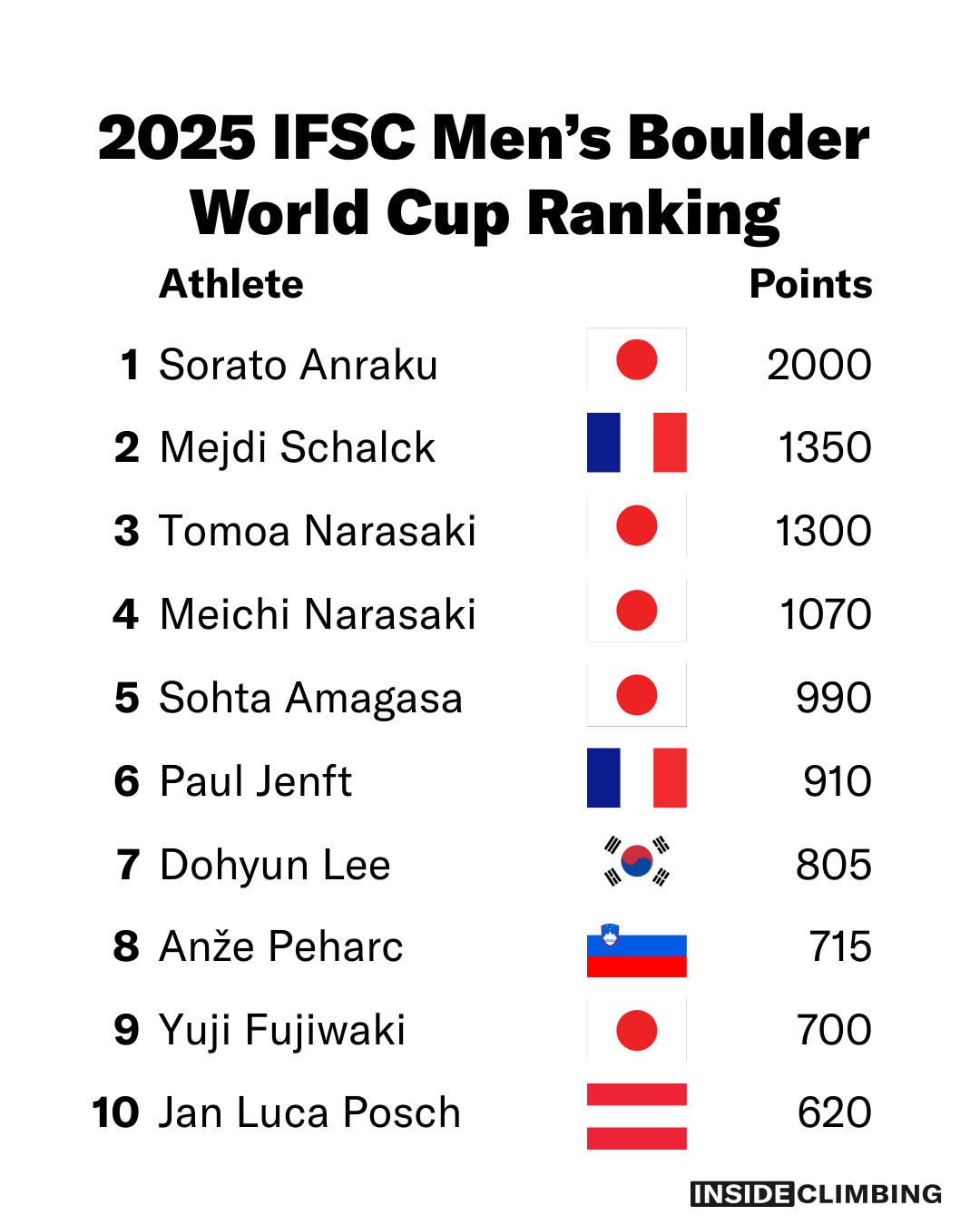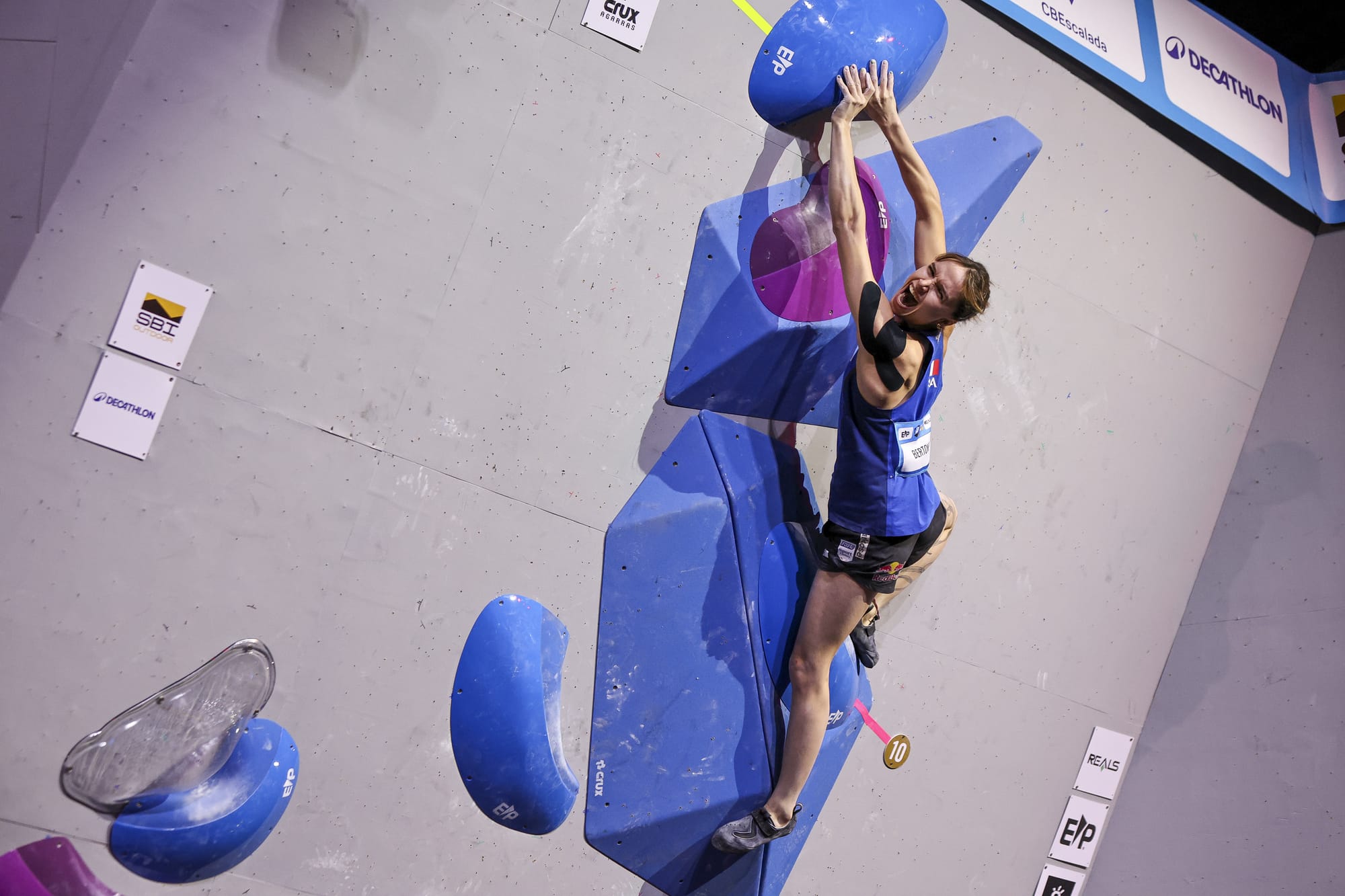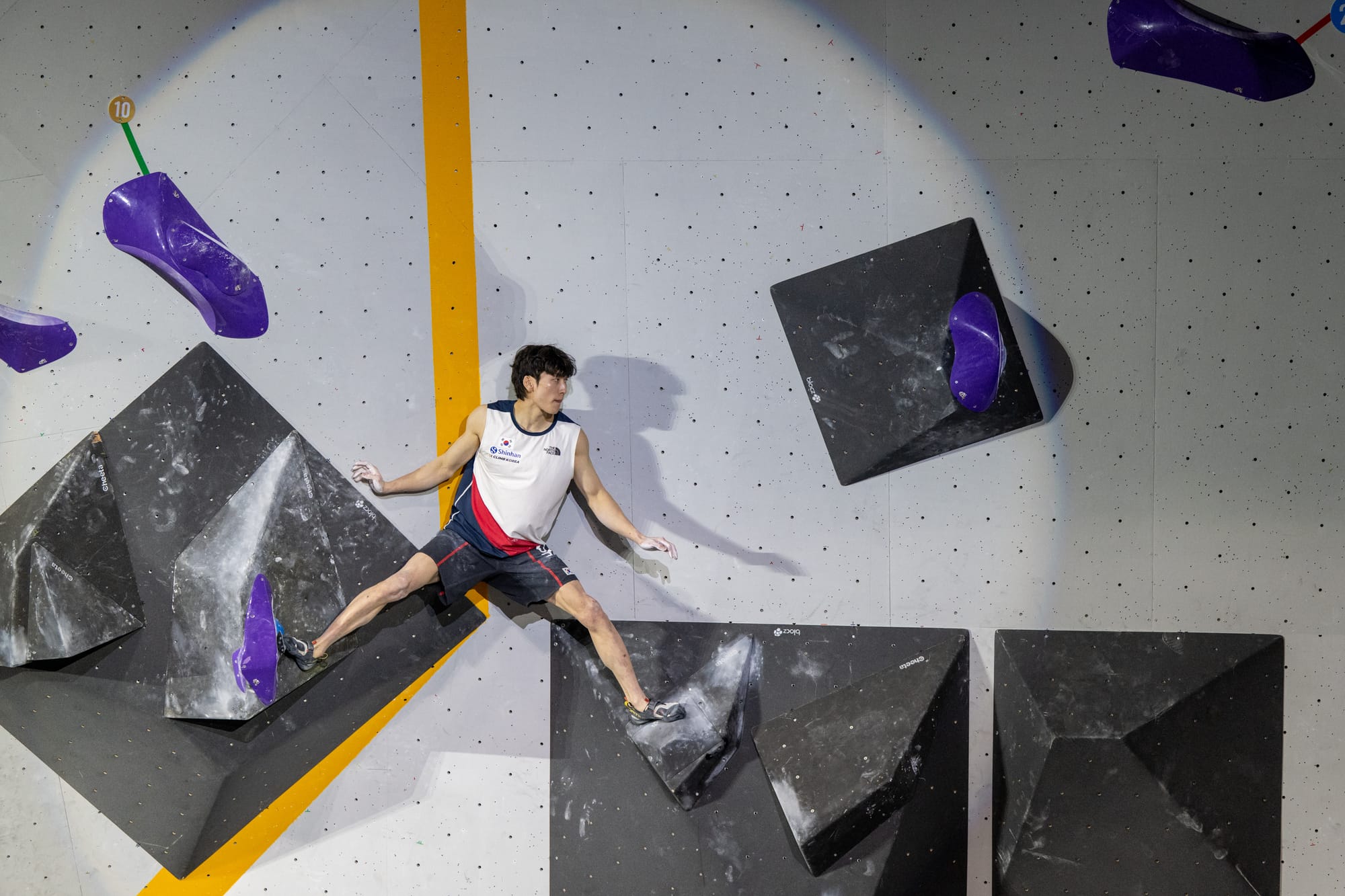Brazil did not disappoint. The crowd sounded like the loudest crowd ever at a World Cup. The enthusiasm of the crowd fuelled the athletes, with many urging the crowd to get behind them.
Though no South American athlete reached the semi-final, the event did a great job of showcasing local athletes and climbing hold brands. Matt was joined in the commentary box twice by Brazilian athletes, who both provided expert insights.
Sorato Anraku keeps on winning
Sorato Anraku won his second gold of the season. This was only his fourth ever Boulder World Cup gold medal. It feels like it should be more. It's easy to forget he's only 18.
The final was a tense one, with only Anraku and Mejdi Schalck topping any of the boulders. Anraku was the only athlete to top the third boulder. The third boulder was a "joker" boulder, designed by the route-setters to surprise the athletes. Schalck couldn't reach the zone on the boulder. This let Anraku pull ahead to win the competition.
Anraku said after the competition, “I'm very happy for my second World Cup gold in a row, but I wanted to send boulder number four... I rested a lot on my attempts because I had no power left, but I felt confident.
I'm not thinking about winning the Series, I will focus on one event at a time, so now it's time to focus on Salt Lake City.”

Mejdi Schalck built on his final performance in Keqiao to win the silver medal. This is only the seventh time he has stood on the podium at a Boulder World Cup. It's great to see him back competing in Boulder World Cups again. He took a break to focus on training for Lead and Boulder for the Olympics. Schalck was the only athlete to top the final coordination boulder, with a massive jump to the top hold.
He said after the competition, “This medal has a crazy taste because everything I have done in my training has paid off. But I'm a bit frustrated for not winning this one because I really wanted it. And I think I was in the good spirit to win.
I'm 10 times stronger when the crowd is pushing me and I feel a connection with them like this time in final, it was just crazy. People were screaming my name, and every time I was telling the crowd to cheer me, they were going crazy. Especially on the last boulder, I was in my flow, it was crazy.”
Tomoa Narasaki finished third, winning his 26th World Cup medal. He reached his first World Cup final back in 2014, over a decade ago. Narasaki was the only other athlete to get all the zones, aside from Anraku.
The final did come down to a fight between athletes from France and Japan. France had two athletes in the final and Japan had five. Only Rei Sugimoto missed out on the final, finishing 22nd in the semi-final. Curitiba was Yuji Fujiwaki's second Boulder final ever - his first was in Munich 2018.
The whole round was hard, with only four tops in the whole round. Low scoring final rounds are more common for the men than for the women. The last men's final with four tops or fewer was in Seoul last year. There have been 12 men's Boulder World Cups and one World Championship with fewer than four tops in the final.
Anraku's win moves him into first place in the Series, 650 points ahead of Schalck. If Anraku wins, he will become the third man ever to win three World Cup series titles. The others are Kilian Fischhuber (Austria), who won fivr, and Jérôme Meyer (France), who won 4. Both won three in a row: Meyer in 2001–2003 and Fischhuber in 2007–2009.
Schalck is only 50 points ahead of Tomoa Narasaki, who is in third. Tomoa moves ahead of his brother, Meichi. There are five Japanese men in the Boulder World Cup top 10, including Sohta Amagasa and Yuji Fujiwaki.

Naïlé Meignan wins her first World Cup
Naïlé Meignan won her first World Cup in Curitiba, building on her bronze and silver World Cup medals from last year. She took time away from competitions after she broke her ACL only a few months after winning the Youth World Championship in 2021.
On the first boulder, Meignan struggled with the lower section, topping the climb just before the buzzer. Meignan went on to flash (topping a boulder on her first attempt) the other three boulders in the final. She won by 0.1 points over her teammate, Oriane Bertone.
Meignan became the seventh French woman to win a Boulder World Cup. She joins Sandrine Levet, Juliette Danion, Stéphanie Bodet, Myriam Motteau, Liv Sansoz, and Oriane Bertone.
Meignan said after the competition, “It feels amazing to win in my first competition of the year. I wasn’t expecting to be this good, but for sure it feels great.”
Oriane Bertone won her eighth World Cup silver medal. Bertone has the highest percentage of silver medals of any World Cup medal winner in the Boulder discipline.
As the only previous World Cup winner at the event, she was the favourite to win. In the final, she dispatched each boulder in one or two attempts until it came to the final physical boulder.
She managed to top it, but she had a couple of foot slips low down on the start holds, so it took her four attempts. When she came down, she celebrated as if she had won the competition. But Meignan could still win, and she did. Bertone lost by 0.1 points, just one fall, and she was visibly upset in the aftermath of the event.

Camilla Moroni won the bronze medal in Curitiba, her second World Cup medal. She managed to move ahead of the four Japanese athletes thanks to tops on the last three boulders of the final. She bounced back after a tough competition in Keqiao, where she didn't make the semi-finals and finished 27th.
Moroni joins fellow Italians, Giulia Giammarco, Jenny Lavarda, and Stella Marchisio, in having two World Cup medals each. No Italian woman has ever won a Boulder World Cup, or more than two World Cup medals.
Moroni said after the competition, “I feel so good. This is actually my first bronze medal, so now the only one that is missing is the gold. I'm not sure I will be able to get that in Salt Lake City, I will be a bit tired, but I will try my best.
French and Japanese climbers are very strong and actually, after the last boulder, I didn't expect to be third because I thought I missed the chance on the first one. But I was still in the game, and I didn't know.”
The competition came down to France vs Japan with two French athletes and four Japanese in the final. All four Japanese athletes topped just two boulders each. Mao Nakamura finished highest with the fewest number of attempts. Futaba Ito finished sixth. Ito holds the record for the highest number of World Cup finals - 10 - without winning a World Cup medal.
Nekaia Sanders from the USA was the only other non-French or Japanese athlete to reach the final. Curitiba was her first World Cup semi-final and final, in only her fourth World Cup.
Bertone's second silver medal moves her into first in the Series. Mao Nakamura moves into second, and Melody Sekikawa, who is only 17, moves into third. There are four Japanese women in the Boulder top ten.

Salt Lake City Boulder World Cup Preview
It is going to be weird having a Boulder World Cup in Salt Lake City (SLC) without Natalia Grossman. She has never lost a World Cup in Salt Lake City.
She is currently recovering from tearing her ACL and meniscus in March, so she will not be competing. This year we will have a new female Salt Lake City winner.
Most of the athletes from Curitiba are travelling to Salt Lake City. There are 124 athletes registered for the World Cup from 28 countries. 67 men and 57 women are registered. There will be two qualification groups for the men, like in Keqiao. For the women, there will be one group, like in Curitiba.
Many of the athletes who skipped Curitiba will be back for Salt Lake City. Though Erin McNeice won't be competing, Great Britain have a team of 8 registered, including Max Milne, Hamish McArthur, Dayan Akhtar and Toby Roberts. Roberts has been recently posting Instagram stories from Innsbruck, so he is unlikely to attend.
Dohyun Lee planned to compete in Salt Lake City, but he can no longer attend. His approved visa got denied just two days before his flight. None of the male South Korean athletes and a coach are able to attend the World Cup after their visas were denied. Lee will next compete in the Prague World Cup.
UPDATE 8:10 22nd May 2025. Lee commented on his post on Instagram that he managed to get an emergency visa and is now going to Salt Lake City to compete. He has since deleted the post.

The USA has a full team of 18 athletes, 10 women and 8 men, attending the World Cup. Adam Shahar, who came seventh in Prague last year, will attend after missing out on joining the USA team earlier this year.
Annie Sanders and Oceania Mackenzie are both registered to compete at the World Cup. Miho Nonaka will also re-join the Japanese team in Salt Lake City. She just opened her own gym, Next Gen Bouldering, in Japan earlier this month. 2024 Olympian Lucia Dörffel will compete at her first World Cup of the season.
The same French team from Curitiba will compete in Salt Lake City. We can look forward to a showdown between Naïlé Meignan and Oriane Bertone. Salt Lake City could potentially have a final with Meignan, Bertone, Sanders, Nonaka, Mackenzie and Camilla Moroni all in it.
On the men's side, we will see if Mejdi Schalck can finally beat Sorato Anraku. Or if Anraku can continue his streak of Boulder World Cup wins to three. Anraku won last year in SLC.
We are unlikely to get Alex Honold commentating at the World Cup this year. Matt Groom mentioned on the live stream in Curitiba that he will try to get Natalia Grossman to join him in the commentary box.
Routesetters
- Gen Hirashima (Japan) - Headsetter
- Stefan Scarperi (Italy)
- Tsukasa Mizuguchi (Japan)
Schedule
All times are local time (UTC-6).
Friday 23rd May
- 09:00 – 14:30 Women's Qualifications (1 qualification group)
- 16:30 – 20:10 Men's Qualifications (2 qualification groups)
Saturday 24th May
- 10:00 – 12:30 Women's Semi-final
- 17:00 Women's Final
Sunday 25th May
- 10:00 – 12:30 Men's Semi-final
- 17:00 Men's Final





